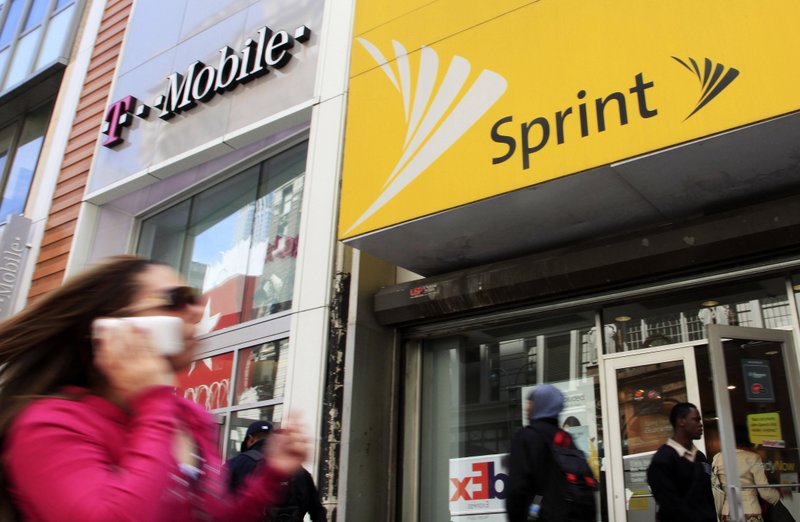NEW YORK -- An antitrust suit aimed at blocking T-Mobile's acquisition of Sprint opened Monday in a crowded courtroom in New York with testimony from Sprint executives that touched on the consumer benefits of the company's competition with T-Mobile and other carriers.
A group of 14 state attorneys general, led by New York and California, aim to convince a federal judge that the $26.5 billion deal should be blocked. T-Mobile has already notched approvals from key federal regulators, setting up an unusual situation where states' officials are seeking to overturn their federal counterparts.
The trial, in U.S. District Court in New York, is expected to last several weeks.
If T-Mobile prevails, the number of major U.S. wireless companies would shrink to three from four. A combined T-Mobile-Sprint would become a fiercer competitor to larger Verizon and AT&T. But the states argue that having one fewer mobile carrier would reduce competition and cost Americans billions of dollars in higher phone bills.
T-Mobile and Sprint provide cheaper alternatives to Verizon and AT&T, and T-Mobile has branded itself the "Un-carrier," one that has made consumer-friendly changes such as bringing back unlimited-data plans and shattering two-year service contracts. There are concerns that less competition would put an end to these types of changes, although T-Mobile says that won't happen.
The states' lawyers on Monday questioned Roger Sole, Sprint's chief marketing officer, and Angela Rittgers, the senior vice president for sales and marketing for Sprint's prepaid brands, Boost and Virgin. Their aim: Demonstrate that Sprint and T-Mobile competed with each other for customers by cutting prices and bringing unlimited plans back to the wireless market, benefiting consumers.
In one example, they showed an email from former Sprint Chief Executive Officer Marcelo Claure to Sole, saying Sprint had to match a buy-one-get-one-free offer from T-Mobile for the iPhone 8. "We have no choice," Claure said.
The deal got the nod from both the Justice Department and the Federal Communications Commission, thanks to T-Mobile's unusual commitment to create a brand-new mobile carrier in a deal with satellite-TV company Dish.
T-Mobile agreed to sell millions of customers to Dish and to rent its network to the fledgling rival while it built its own. Absent that arrangement, the Justice Department said, the deal would have been bad for consumers. Dish would start providing cellphone service after buying Sprint's current prepaid-service business. Dish is also required to build a faster, next-generation network, known as 5G, over the next several years.
The states say the Dish fix isn't good enough. In a court filing, lawyers argued that T-Mobile and Sprint shouldn't be allowed to combine "based on the hope that Dish will one day grow into a viable wireless company equal to a competitor that already exists today."
T-Mobile, which promised not to raise prices for three years, defends its deal as good for competition. It repeats previous arguments that the combined T-Mobile and Sprint will be able to build a better 5G network -- a priority for the Trump administration -- than either company could manage on its own.
Although it's unusual for states to try to block a deal already approved by the federal government, experts note that states in recent years have been playing a bigger role in antitrust enforcement. They have gone after generic drug makers and hit tech companies with their own investigations.
"The states have going for them a pretty clear, straightforward application of the antitrust laws," said Jeffrey Blattner, a former Justice Department official who now teaches at the University of Colorado. "The states have the wind at their back in terms of the law. How the facts play out, we'll find out in the courtroom."
Business on 12/10/2019
